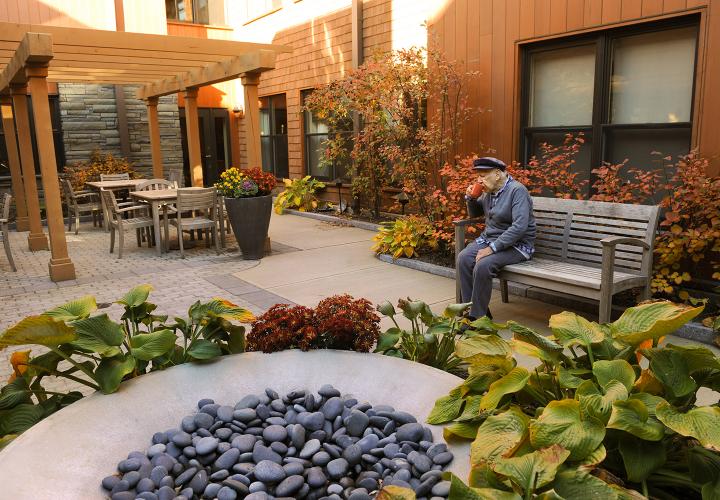Expertly Managed Programs for High Quality Alzheimers Care Charlotte Services
Expertly Managed Programs for High Quality Alzheimers Care Charlotte Services
Blog Article
Producing a Safe and Helpful Atmosphere for Alzheimer's Treatment
The development of a risk-free and helpful setting for individuals with Alzheimer's is extremely important in enhancing their lifestyle. This includes not only physical adaptations within the home, such as minimizing risks and including familiar aspects, but likewise the implementation of structured routines and purposeful activities that deal with their cognitive requirements. Moreover, understanding the emotional and psychological measurements of care can dramatically impact their feeling of safety and security and link. Exploring these diverse strategies can disclose critical insights into reliable caregiving approaches that might transform the daily experiences of both caregivers and individuals.
Understanding Alzheimer's Needs
Frequently, people with Alzheimer's condition show a series of demands that call for customized strategies to care. As the problem advances, cognitive decline manifests in numerous means, influencing memory, thinking, and even the capability to carry out daily tasks. Caretakers need to acknowledge these progressing requirements to offer appropriate assistance and make certain a better of life for those affected.
One critical facet of recognizing Alzheimer's requirements is acknowledging the importance of regular and knowledge. People typically find convenience in well established patterns, which can minimize stress and anxiety and confusion. Caregivers must strive to produce organized everyday schedules that include purposeful activities straightened with the individual's interests and capacities.
Additionally, reliable communication is paramount. People with Alzheimer's may have a hard time to express themselves or comprehend intricate language. Caregivers need to employ straightforward, clear language, use non-verbal signs, and method energetic listening to cultivate understanding and connection.
Last but not least, emotional and social needs can not be forgotten. Offering possibilities for social interaction and preserving relationships can substantially enhance emotional health. Caregivers must encourage interaction in area activities or household celebrations, promoting a sense of belonging and objective. Understanding these diverse demands is important for producing an encouraging care atmosphere.
Designing a Safe Home
Creating a risk-free home for individuals with Alzheimer's disease is important to reducing dangers and promoting freedom. The layout of the home must focus on security while allowing for personal convenience. Initially, eliminate prospective threats such as loose rugs, sharp objects, and mess, which can bring about drops or mishaps. Make certain that paths are clear and well-lit, as proper lighting minimizes disorientation and improves mobility.
Incorporating flexible features is additionally important. Mount grab bars in shower rooms and near stairs, and think about using non-slip floor coverings in wet locations. Additionally, using contrasting colors for wall surfaces and floors can help in identifying areas, aiding to reduce complication.
Knowledge is necessary for people with Alzheimer's. Personalizing the environment with acquainted things and photos can strengthen a sense of belonging and security - Alzheimers Care Charlotte. It is additionally useful to have actually a designated location for day-to-day activities, such as reading or crafting, which can give structure to their day
Lastly, carrying out a secure outdoor area permits for safe exploration while getting in touch with nature. By attentively designing the home atmosphere, caretakers can dramatically enhance the quality of life for individuals coping with Alzheimer's illness.
Enhancing Communication Abilities

Non-verbal interaction, including facial expressions, motions, and touch, plays a critical duty in communicating empathy and understanding. Keeping eye call and a calm disposition can enhance the convenience level of the individual, advertising a sense of safety.
In addition, it is essential to exercise active listening. This entails being completely present, revealing perseverance, and enabling the person to share themselves without interruption. Rep might be necessary; caretakers ought to be prepared to revisit inquiries or topics, as people with Alzheimer's may battle with memory recall.
Furthermore, using aesthetic help or hints, such as photographs or acquainted things, can assist in recognition and interaction. Ultimately, improving interaction skills is concerning building trust fund and creating a setting where individuals feel listened to, valued, and understood, consequently enriching their lifestyle.
Urging Social Interaction
Promoting meaningful social interactions can substantially enhance the wellness of people with Alzheimer's illness. Involving with others not only aids combat sensations of isolation yet also stimulates cognitive feature and psychological wellness. Structured social tasks, such as team arts, crafts and video games, or music therapy, produce possibilities for residents to get in touch with peers and caretakers, which can bring about improved mood and decreased anxiousness.
Developing an inviting setting that urges socializing is vital. This can be attained by preparing public spaces that facilitate interaction, such as comfortable seating areas or activity spaces. Furthermore, integrating culturally pertinent and acquainted tasks can urge and trigger memories engagement, permitting people with Alzheimer's to really feel more connected to their past experiences.
Additionally, caretakers ought to be trained to identify and promote social engagement amongst citizens. By prioritizing social communication, we can substantially enrich the lives of those living with Alzheimer's, fostering a feeling of neighborhood and belonging.
Sustaining Caretaker Wellness

To support caregivers, companies should provide normal training and educational resources to improve their understanding of Alzheimer's condition and caregiving techniques. Offering access to break treatment solutions permits caregivers to take required breaks, minimizing anxiety and exhaustion - Alzheimers Care Charlotte. Additionally, promoting a neighborhood via assistance teams can facilitate emotional sharing and the exchange of useful recommendations amongst caretakers, developing a network of common assistance
Psychological health and wellness resources, such as counseling solutions, can additionally be vital in dealing with the emotional toll caregiving can take. By prioritizing caregiver well-being, we develop an even more lasting caregiving setting that not just benefits the caregivers themselves but also boosts the total top quality of treatment gotten by individuals with Alzheimer's. Ultimately, supporting caretakers is a crucial part in cultivating a caring and efficient treatment setup.
Final Thought
In final thought, the creation of a helpful and safe environment for people with Alzheimer's is vital to enhancing their lifestyle. By focusing on safety via thoughtful design, cultivating emotional health with familiar elements, and advertising interaction through structured regimens, caregivers can significantly influence the general experience of those affected by this problem. Furthermore, supporting caretaker well-being is important, as it ultimately adds to a more thoughtful and efficient treatment atmosphere.
Repetition may be necessary; caregivers need to be prepared to review subjects or questions, as individuals with Alzheimer's might battle with memory recall.

Report this page